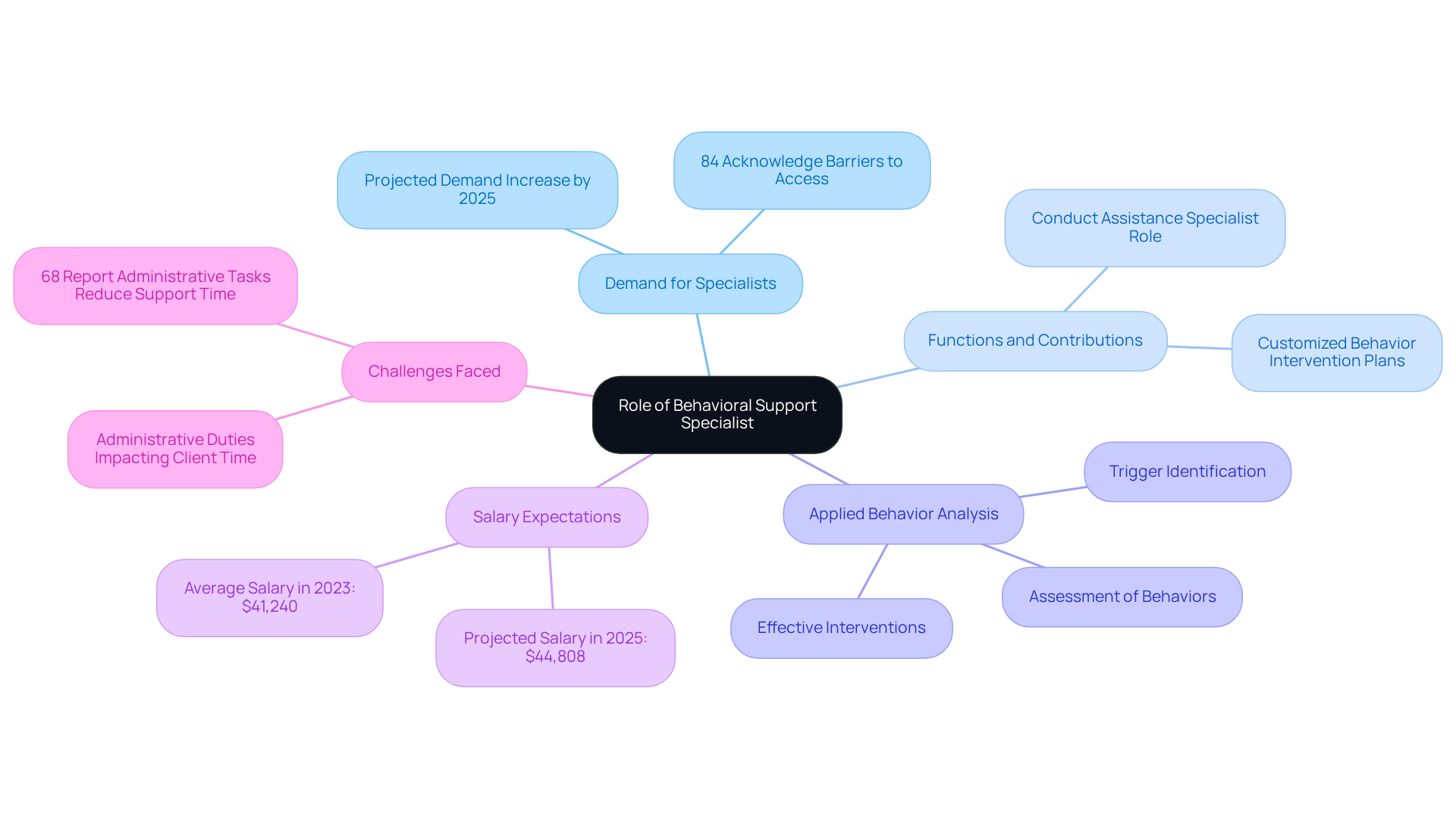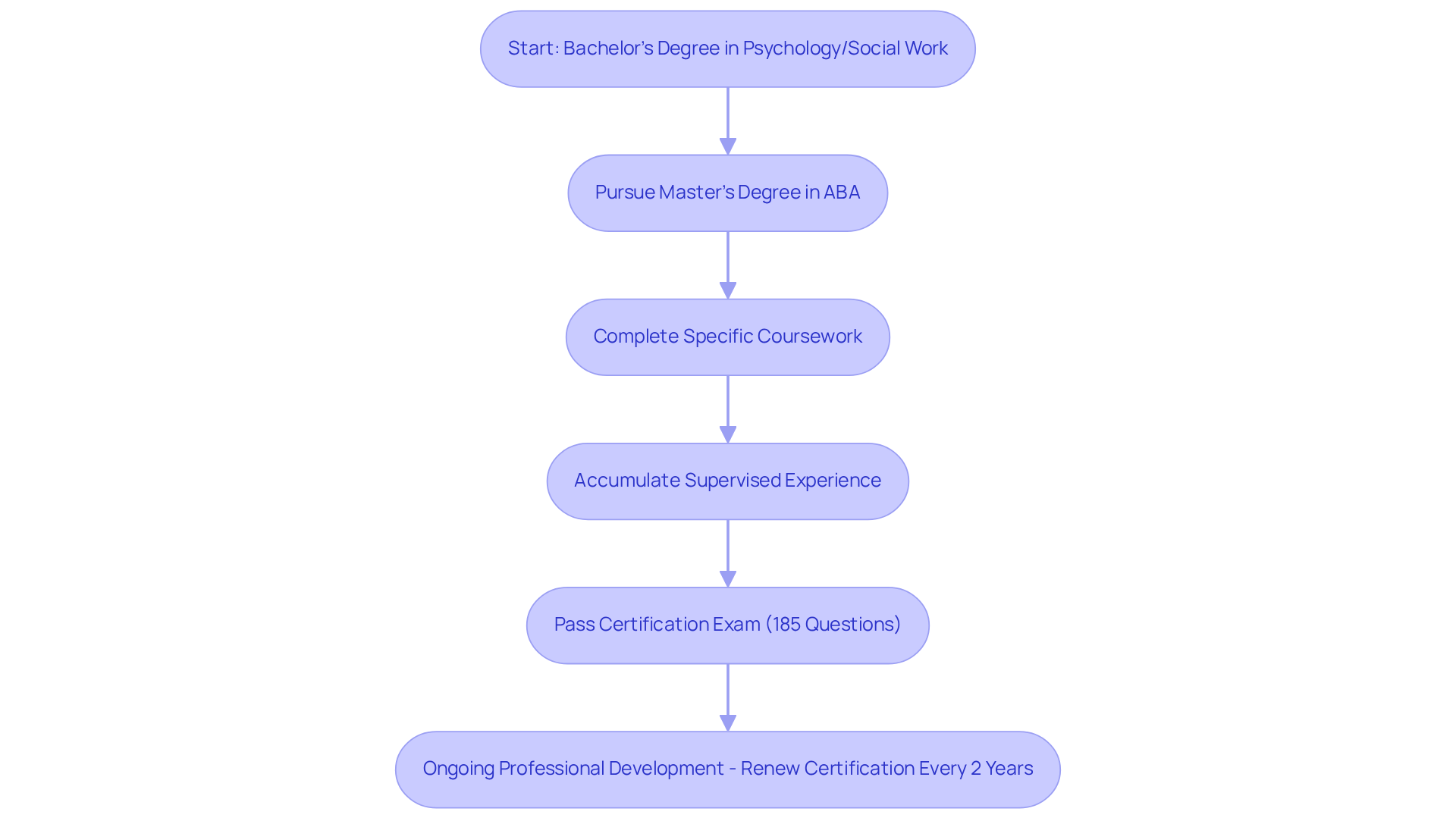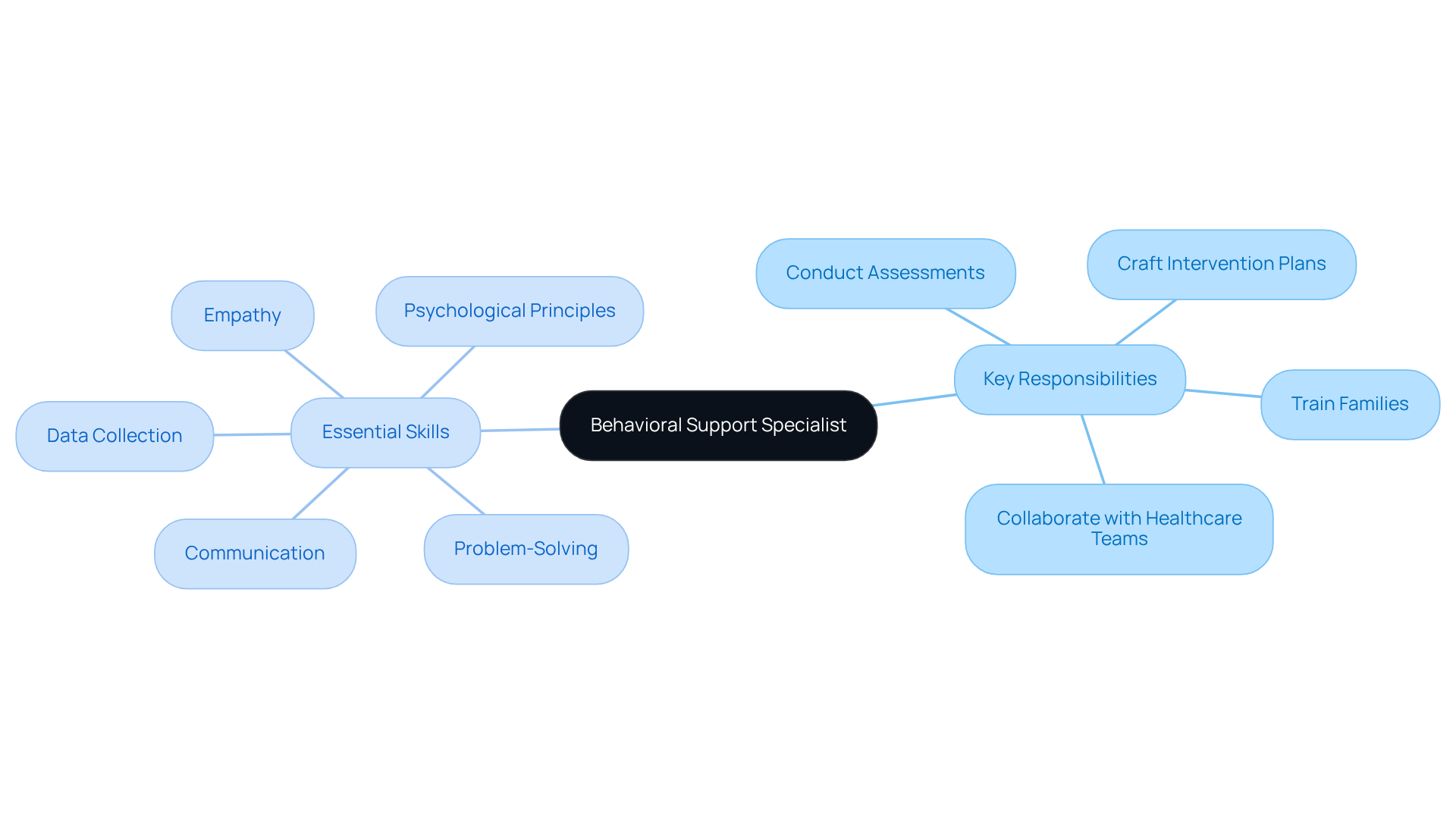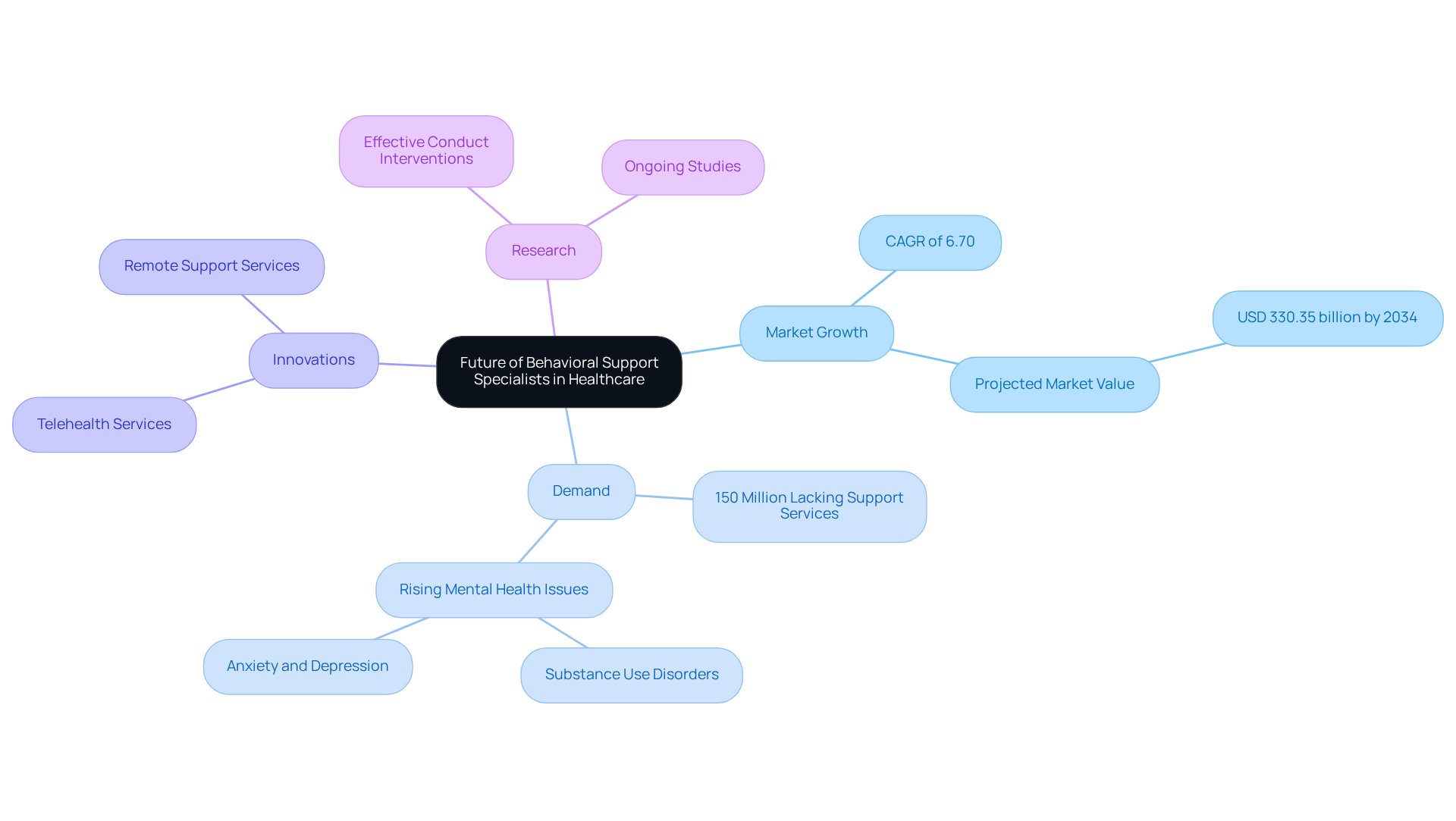October 22, 2025

The demand for Behavioral Support Specialists in healthcare is surging, reflecting an urgent need for tailored behavior intervention plans that not only enhance patient engagement but also effectively manage challenging behaviors. This rising recognition of mental wellness needs underscores the necessity for personalized support strategies across diverse healthcare settings.
As healthcare employers, are you facing challenges in recruiting qualified specialists? Consider the benefits of utilizing Hire ABA for your recruitment needs. With the increasing emphasis on mental health, hiring the right professionals is more critical than ever. Hire ABA offers a reliable platform to connect with skilled Behavioral Support Specialists, ensuring your organization can meet the growing demand for mental wellness support.
Take action now to enhance your team and improve patient outcomes.
The increasing demand for Board Certified Behavior Analysts (BCBAs) underscores a pivotal shift in the healthcare landscape, where the significance of behavioral support specialists is gaining unprecedented recognition. These professionals are essential in enhancing mental well-being, addressing significant barriers to care, and fostering positive behavioral changes among patients.
However, as the need for qualified specialists surges, organizations encounter challenges in hiring the right talent. How can healthcare providers effectively navigate this evolving field to ensure they have the skilled professionals necessary to meet the growing demand?
A staggering demand for Board Certified Behavior Analysts (BCBAs) is on the horizon, with the need for behavioral support specialists expected to rise considerably by 2025. This trend reflects a growing recognition of the essential roles of behavioral support specialists in mental well-being care. A significant 84% of mental wellness professionals believe that individuals requiring assistance face substantial barriers to access, highlighting the critical nature of the behavioral support specialist in bridging service delivery gaps.
A Conduct Assistance Specialist is a trained expert dedicated to implementing strategies that support individuals facing conduct challenges, particularly in healthcare environments. These specialists work closely with patients, families, and interdisciplinary teams to develop and execute customized behavior intervention plans that cater to individual needs. Their contributions as a behavioral support specialist are vital in fostering positive conduct changes and improving the quality of life for those with developmental disabilities, mental wellness challenges, or other conduct issues.
Utilizing principles of Applied Behavior Analysis (ABA), Conduct Assistance Specialists assess behaviors, identify triggers, and apply effective interventions. To enhance the effectiveness of hiring these specialists, personalized resume assessments offered by Hire ABA can optimize job matching for BCBAs. These assessments not only align candidates with roles that suit their skills and preferences but also streamline the recruitment process, ensuring that healthcare employers find the right fit for their teams.
Moreover, the anticipated typical salary for mental wellness professionals in 2025 is $44,808, making this a financially appealing career choice. Dr. Pamela Fullerton underscores the importance of this field, stating, "All the skills we need to do well in this field are important since we are dealing with people's lives and livelihoods." Additionally, it is crucial to note that 68% of mental wellness workers report that administrative duties diminish client assistance time, emphasizing the challenges faced by specialists.
Are you currently grappling with hiring challenges in your organization? Consider how Hire ABA can effectively address these issues and streamline your recruitment process.

The demand for Board Certified Behavior Analysts (BCBAs) is projected to rise by 25% in the coming five years, underscoring the critical role of experts in assistance within healthcare. As the recognition of mental wellness and behavioral challenges grows, the role of the behavioral support specialist is becoming increasingly essential in hospitals, rehabilitation centers, and outpatient clinics. The expertise of a behavioral support specialist is invaluable in effectively managing challenging behaviors that may arise during treatment. By providing targeted support, behavioral support specialists not only enhance patient engagement but also cultivate a more therapeutic environment, significantly reducing the risk of crisis situations and improving adherence to treatment plans.
The importance of these professionals is further illustrated by the anticipated 18% growth in employment for substance abuse, behavioral disorder, and mental health counselors from 2022 to 2032. This trend reflects a broader demand for mental health services, highlighting the expanding opportunities for Assistance Specialists. Currently, approximately 30% of healthcare facilities employ behavioral support specialists, which emphasizes their critical role in contemporary healthcare delivery.
As the market continues to evolve, it is imperative for professionals in the field to stay informed about new opportunities. Consider exploring the promising career paths available in this dynamic environment. Are you facing challenges in hiring qualified Assistance Specialists? Engage with platforms like Hire ABA to streamline your recruitment process and ensure you attract the best talent in this growing field.

Candidates typically need a bachelor's degree in psychology, social work, or a related field to become a behavioral support specialist. With over 40,000 Board Certified Behavior Analysts (BCBAs) worldwide, the demand for these professionals is projected to grow by 22% over the next decade. This significant increase highlights the urgent need for qualified practitioners in the field. Many professionals further their education by pursuing a master's degree in Applied Behavior Analysis or a related discipline.
Certification as a BCBA is often essential, as it is a requirement for many positions. This certification necessitates:
Furthermore, ongoing professional development and adherence to ethical guidelines are crucial for maintaining certification, which must be renewed every two years through continuing education. This dedication to lifelong learning guarantees that BCBAs maintain high standards of practice in the field, aiding in the effective provision of support services.
As mentioned, "ABA therapy is empirically validated to assist individuals with various conduct issues, making it a favored approach in many healthcare settings."
Are you facing challenges in hiring qualified BCBAs? Consider how Hire ABA can streamline your recruitment process and ensure you have the best professionals on your team.

The role of a behavioral support specialist is critical in today's healthcare landscape. The behavioral support specialist has key duties that include:
Moreover, specialists are responsible for providing essential training and support to families and caregivers, ensuring that interventions are consistently applied across various environments.
To excel in this role, strong communication abilities, empathy, and problem-solving skills are paramount. A deep understanding of psychological principles further enhances the effectiveness of interventions. Additionally, specialists must be proficient in data collection and analysis, enabling them to evaluate the success of their strategies and make necessary adjustments for optimal outcomes.

The outlook for Support Specialists in healthcare is increasingly promising, driven by a heightened focus on mental wellness and intervention strategies. As healthcare systems progressively integrate mental wellness into primary care, the demand for these experts is anticipated to rise. Notably, the global behavioral wellness market is projected to expand at a compound annual growth rate (CAGR) of 6.70% from 2025 to 2034, underscoring the surging need for qualified professionals in this sector.
Innovations in telehealth and remote support services are poised to broaden the practice scope for behavioral support specialists, enabling them to effectively reach underserved populations. This is particularly significant given the alarming shortage of mental care experts, with nearly 150 million individuals living in areas devoid of adequate mental support services.
Furthermore, ongoing research into effective conduct interventions will strengthen the evidence base for practice, equipping behavioral support specialists with the latest strategies to provide impactful support to individuals. As Bhushan Pawar notes, there is a growing awareness and destigmatization of mental well-being issues, further emphasizing the importance of these roles.
This evolution signifies a substantial shift towards more integrated and accessible mental health care, aligning with the increasing recognition of the role behavioral health plays in overall wellness.

The role of behavioral support specialists is increasingly recognized as a cornerstone in the healthcare landscape, particularly in mental health and wellness. With a projected growth in employment opportunities and a rising salary outlook, the demand for Board Certified Behavior Analysts (BCBAs) is on the rise. Their contributions to patient care and overall mental well-being are becoming ever more significant. Behavioral support specialists not only provide essential interventions but also serve as vital links in overcoming barriers to access, ensuring that individuals receive the support they need to thrive.
Key insights reveal the essential responsibilities these specialists undertake and the educational pathways required to enter this field. Their ability to implement tailored behavior intervention plans and work collaboratively within healthcare teams enhances patient engagement and treatment adherence, ultimately leading to better outcomes. As the healthcare system evolves to prioritize mental wellness, the role of behavioral support specialists will undoubtedly expand.
This presents an opportunity for aspiring professionals to engage in a fulfilling career that not only offers financial stability but also makes a profound impact on individuals' lives. Embracing this trend and investing in the development of qualified specialists is crucial for fostering a more supportive and effective mental health care environment. Are you ready to address the hiring challenges in your organization? Consider how partnering with Hire ABA can help you secure the right talent to meet these growing demands.
What is the role of a Behavioral Support Specialist?
A Behavioral Support Specialist, also known as a Conduct Assistance Specialist, is a trained expert who implements strategies to support individuals facing conduct challenges, particularly in healthcare settings. They work with patients, families, and interdisciplinary teams to develop and execute customized behavior intervention plans.
Why is there an increasing demand for Behavioral Support Specialists?
The demand for Behavioral Support Specialists is projected to rise significantly due to a growing recognition of their essential role in mental well-being care. By 2025, the need for Board Certified Behavior Analysts (BCBAs) is expected to increase, with many mental wellness professionals acknowledging substantial barriers to access for individuals requiring assistance.
How do Behavioral Support Specialists utilize Applied Behavior Analysis (ABA)?
Behavioral Support Specialists use principles of Applied Behavior Analysis (ABA) to assess behaviors, identify triggers, and implement effective interventions tailored to individual needs.
What is the anticipated salary for mental wellness professionals in 2025?
The typical salary for mental wellness professionals in 2025 is projected to be $44,808, making it an appealing career choice in the field.
What challenges do Behavioral Support Specialists face in their work?
A significant challenge faced by Behavioral Support Specialists is that 68% of mental wellness workers report that administrative duties reduce the time available for client assistance, impacting their ability to provide support.
What impact do Behavioral Support Specialists have in healthcare environments?
Behavioral Support Specialists enhance patient engagement, create a more therapeutic environment, reduce the risk of crisis situations, and improve adherence to treatment plans in hospitals, rehabilitation centers, and outpatient clinics.
What is the employment outlook for mental health services?
There is an anticipated 18% growth in employment for substance abuse, behavioral disorder, and mental health counselors from 2022 to 2032, reflecting a broader demand for mental health services and expanding opportunities for Assistance Specialists.
How can organizations address hiring challenges for Behavioral Support Specialists?
Organizations facing hiring challenges can engage with platforms like Hire ABA to streamline their recruitment process and attract qualified Assistance Specialists in this growing field.
Our expert recruitment strategies and AI-driven sourcing ensure that you receive top-notch candidates quickly, without compromising on quality. Whether you’re looking for BCBAs, Clinical Directors, or RBTs, we’ve got you covered.